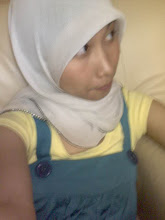Monday, January 28, 2008
~it is not always as it is seems,in this case heard~
I was introduced to a new term in the teaching of drama, EDU 3217 class today; implicature. Implicature is actually an underlying discourse that is often used by characters to say something which is implied with another underlying meaning. At first, I stumbled a lot in recognizing the lines which is implied with this literary feature but after I was given the examples from the respected Assoc. Prof. Dr Edwin himself, I think I can distinguish an implied line from the non-implied line. Dr. Edwin has given us some text to work on during class and this has resulted in a better understanding of what it really means. The extracts of text are from Shakespeare’s Macbeth and Harold Pinter’s A Night’s Out. In short, the class today has made us more aware of what the actors are saying because implied words are bound to happen anytime and anywhere during the play.
Today’s lecture is quite interesting than always because for the first time we are ask to work in pairs and perform a text of drama in front of the class. What has made the activity much more exciting is the fact that we can create our own characters and situation in which the character is in. Some pairs had come up with a lot of unique ideas in performing and a team has also performed with three persons instead of two but still their performance is good and understandable. I believe that the fewer stage directions in the text have given more room for the actor to form their own characteristics based on their comprehension regarding the line itself. It is such a surprise that we can do a lot of experimentations with a simple text even. We as the actors can interpret the text with our view regarding the matter but it is crucial for the actors to consider and follow the stage directions stated in it.
~what a literature minor student should know~
Today’s class taught us all about the differentiation of certain types of dramas. There are several types of drama such as tragedy, comedy, tragicomedy and farce; all types of dramas hold their specific characteristics like the name they bear. For example tragedy dwells with the falling from high respect to the depth of humiliation and comedy revolves around the aspect of a group of people sharing the same social value. Tragicomedy in the other hand brings out the nature of tragedy but it ended up with a happy ending whereas farce is all about extreme comic situation. I was taught about the details of each drama should hold and they are the details that distinguish each type from the other. Later in this class I was given a simple explanation on the conventions of theatre; the text, the acts, the scenes, the stage directions and so much more. Thus enlighten me about drama; it is certainly not an easy task because a lot of team work is crucial in performing a good and sensational play.
~first impression~
The literary component of drama has always captivated me the most because of its way of delivering is much different than the other literary components there is; drama is performed and not read. During the teaching of drama class, EDU 3217 I was informed the basics knowledge of drama itself. What is drama and how it is actually cultivated in the society all over the world. Every place has its own significant history of drama as I was taught and the earliest sort of drama is developed in the Aristotelian age by the philosopher himself, thus embarking the glorious age of the Greek Theatre. The names that have made Greek Theatre a great mark in the history of theatre are such as Aristotle, Aeschylus, Sophocles, Euripides and Aristophanes. I was also taught about how different kind of drama resolves in their own characteristics and identity. For instance, the Roman Theatre rose after the emergence of Christianity and their concept of entertainment is more to the violent side of life. Gladiators are an example of the Roman entertainment. Medieval theatre in the other hand starts with the era of Queen Elizabeth the first. Restoration drama came next followed by the 18th-19th century drama. Modern drama came after that and it also known as the 20th century drama and it dwells with Freudian interpretation of life. I am astonished by the development of drama and theatre because it took a great deal of efforts and restoration just to make sure the essence of traditional drama is preserved.
Subscribe to:
Comments (Atom)


